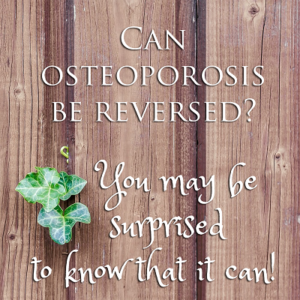 Osteoporosis is a condition in which the density of the body’s bones decreases below what is considered a normal or safe limit. Proactive, preventative action can help delay the onset and reduce the degree of any osteoporosis that may later occur.
Osteoporosis is a condition in which the density of the body’s bones decreases below what is considered a normal or safe limit. Proactive, preventative action can help delay the onset and reduce the degree of any osteoporosis that may later occur.
While prevention is the ideal, the reality is that many people have a diagnosis of osteoporosis thrust upon them with no warning or expectation. Upon being diagnosed with osteoporosis an obvious first question is – can it be reversed?
Once osteoporosis is confirmed, action can also be taken to prevent it from worsening or at the very least limiting the rate of bone mass reduction. With proper management, bone density can be increased, which means effectively reversing osteoporosis. Here are some useful tips to prevent or “reverse” osteoporosis:
Avoid or Reduce Intake of Carbonated Beverages
A study done by the renowned Tufts University displayed a distinct correlation between cola drink consumption and hip bone density in women. The more cola this group of participants consumed, the greater the bone density loss in that area.
Caffeine is Not Bone-friendly
Caffeine makes you lose calcium through your urine. For every cup of coffee you drink, you can lose 150 mg of calcium. Try tea instead!
Cut Out the Antacids
Acid blocking drugs or antacids are predominantly used to treat heartburn and gastritis. Stomach acid is a necessary ingredient to enable calcium, magnesium, and zinc to be absorbed. These minerals are all essential to maintaining and increasing bone density.
Taking excessive antacids decreases the volume of stomach acids and will result in poor absorption of these minerals, thereby increasing the risk of osteoporosis.
Too Much Protein is Not Good
Excess protein intake causes the body and blood to be slightly acidic which causes calcium to be excreted via the urine in an attempt to balance the pH levels. 2-4 ounces of lean protein per meal is the recommended allowance.
Get Calcium – the Right Kind of Calcium
Not all calcium supplements are the same. Calcium carbonate is poorly absorbed by the body, although some sellers may claim otherwise. In addition, calcium carbonate causes a reduction in stomach acids which adversely affects calcium uptake. The best kinds of calcium are calcium citrate and calcium hydroxyapatite.
Get Plenty of Vitamin D
Vitamin D is a very important vitamin for skeletal strength. Vitamin D helps the bones absorb calcium and the best way to obtain this essential vitamin is through exposing yourself to the sun’s rays. The safest way to acquire vitamin D without risking skin cancer is exposure to the sun early in the morning before the heat of the day.
If your lifestyle or work limits your access to sunlight, vitamin D supplementation is readily available from pharmacies and health stores.
Monitor Your Hormones
Hormonal fluctuation and decline is the most common cause of osteoporosis among menopausal women and andropausal men. Hormone imbalance accelerates bone loss so maintaining hormonal levels is important to maintain bone density and integrity.
Thyroid and parathyroid hormone levels can also contribute to bone loss. Hormone levels should be monitored so that supplementation can be given if required to minimize effects on bone density.
People who have healthy diets and engage in physical activity are far less likely to develop osteoporosis than inactive people who eat unhealthy foods. Our lifestyle contributes greatly to maintaining skeletal strength and preventing degeneration in the future.
A healthy diet, frequent and regular exercise and a low stress lifestyle will have a large impact on reversing osteoporosis. The same simple, healthy life choices that help reduce the risk of lifestyle diseases will also help keep osteoporosis at bay!






